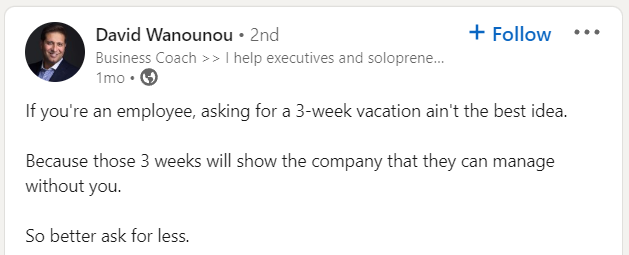A few weeks ago, a LinkedIn connection posted an apology (no, not the crying CEO variety). She wrote:
Big, heartfelt apology to all the working parents who came before me.
I'm sorry I didn't make you feel better supported when you needed it. I had no idea children were really sick all the time.
Sincerely,
Working Mom of Two Toddlers (who, yes it's true, are really sick all the time)
I had to chuckle a bit. I’m past the toddler phase in life, but I remember those years. My older two kids are 2.5 years apart and between the two someone always had a fever, or strep throat, or a runny nose.
In exchange for our vigilance against Covid, we’ve had a reprieve from childhood illnesses for the past two years. The combination of mask-wearing and distance means I can count on one hand the number of times we were sick (other than the time Covid actually entered the house).
As the mornings get colder and I feel Fall creeping into the air, it’ll be interesting to see what this year’s cold-and-flu season brings — in addition to Covid infections. And it’ll be interesting to see how (or if) employers continue to extend flexibility to working parents.
Because let me tell you, many are reverting back to “put your life aside, put work first” mentality. They learned to be accommodating during the pandemic and then… forgot. Or maybe they were only pretending to care as part of a societal response to our collective situation. Once that collective situation has dissipated, parents are back to being on their own.
Lack of support begins with pregnancy
Sometimes people post things in the “unpopular opinion” category that are so egregiously bad that they deserve every ounce of the backlash they receive.
Consider this dude on LinkedIn, warning people not to take too much vacation.
Nevermind the fact that an employer should be able to manage without you. Companies with single points of failure are on shaky ground (can we say The Great Resignation? Or check out the Twitter handle @fuckyouIquit for further inspiration).
But my immediate reaction to this “business coach” was that mothers must not do well in his organization. After all, according to him, if you take more than 3 weeks off, that’s too much. I assume that includes pregnancy and childbirth, since an organization would be forced to “manage without you.”
Then I read that Hulu is rolling back parental leave from 20 weeks to 8 weeks. What a way to say, “We don’t care about the well-being of our employees. We only care about ourselves.” Indeed, the Wall Street Journal reported that in 2020, 53% of companies offered paid maternity leave beyond what is required by law. Which is an interesting statement since no paid leave is required by law in the U.S. I assume it means the 12 weeks of unpaid leave allowed by FMLA. Anyway… that number is now down to 35% of companies providing leave beyond what is required.
No wonder younger generations are eschewing parenthood. The demands on parents are higher than ever and support systems are shrinking.
Childcare is an issue more than ever
Any parent can attest: it sucked during the pandemic. Daycares and schools were shut down, leaving parents stretched too far too thin.
Child care was already astronomically expensive. In this post-pandemic world, it got even worse. Labor shortages have driven up the cost and some parents can’t find care at all — sitting on wait lists for months or longer. It became too much for some families. The result? Millions of women have left the workforce altogether.
I was fortunate: my husband and I were already remote employees. It was a huge struggle, but we weren’t trying to set up our remote environments and habits while simultaneously taking care of our three kids.
But company support was one reason that I began to think about leaving my job in mid-2020.
It was July. We all thought that the pandemic would be over within three months and it wasn’t — not even close. I was on a leadership call with the two other executives at my company. The CEO complained that sales hadn’t picked back up to a pre-pandemic pace.
I told him that any prospective clients who were also parents had priorities other than “buying enterprise loan management software.” They likely were trying to survive the day and do the bare minimum. If I’d been on the buyer’s side, implementing such a complex solution with no light at the end of the pandemic tunnel would have been a hard pass.
Yet, the CEO didn’t get it. He had one grown child. Even after I gave him my perspective on the below-average pipeline, he was still huffy. People should have figured it out by now. Work comes first. That was the message I heard, even without those explicit words. He was always going to put the company first, instead of people.
Flexibility is needed throughout parenthood
Sure, things are different now. The schools are open. Child care is (sort of) an option. But that doesn’t change the fact that parents need flexibility.
Earlier this week, I got a call from the school nurse. My oldest son — in middle school — was in her office. He was seeing spots and feeling faint. In all of my years as a parent, that was a new one. Nothing else I had planned for the workday mattered; I immediately drove to the school.
After talking to my son a bit more, I was pretty sure he had a migraine. I went to Walgreens to pick up a few things to help relieve the symptoms and got him settled into his room with all the lights out.
I sent my boss a Slack message once I was back at my desk. He replied, “I hope it goes without saying, but do what you need to do to take care of your son.”
Yes, it did go without saying because I’m in a super supportive work environment, but I appreciated him saying it all the same.
If parents were in-office before and home during the pandemic, why would they want to go back? Maybe some want the separation. But for many, remote work (and, at a minimum, flexible work) makes parenting easier. It’s flexible hours when kids are sick, or babies have to go to the doctor, or school is randomly closed for a teacher in-service. It’s leaving early for a sports game or to pick a kid up from band practice.
Make no mistake: I think remote work should be offered to everyone, not just parents. But parents, in particular, feel the strain when companies prioritize The Work over The People.
Further Reading
A roundup of stuff from around The Interwebs. Some to make you smile, some to make you roll your eyes. And some stuff that I wrote on other platforms.
To Be Happier at Work, Think Flexibly About Your Job (Yale Insights)
Where do we put our ambition now? (Sarah Watcher-Boettcher)
The Joy of Being Alone (Lyz Lenz)
You can also follow me on LinkedIn for more insights about work, Threads where I’m a bit spicier, and my blog where I share tips for solopreneurs. Or, catch up on the personal side of my life here.
This publication is free because I love sharing ideas and connecting with others about the future of work. If you want to support me as a writer, you can buy me a coffee.









Bravo Anna! So well said! I was lucky to already work for myself when I had my daughter and could not imagine being about to manage it under the constraints I had when I worked a 9-5. But let's be real, parenting as a freelancer is no walk in the park either. I was incredibly luck to have clients who continued to pay ongoing contracts while I took time off after giving birth and always supported me when I need to move a meeting, pump or breast feed during a call, or bring my daughter with me when I worked. We should work because it facilitates the life we want, including being the best parents we can be. If it doesn't do that, then there's no point.